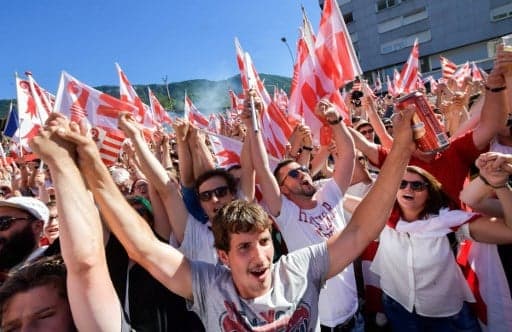‘Mouxit’: Moutier’s decision highlights Switzerland’s cultural divide

With four national languages, Switzerland is rightly proud of its linguistic richness, but the so-called röstigraben is alive and well, as proved by Sunday’s historic referendum in Moutier.
The decision by the French-speaking commune of Moutier to leave the predominantly German-speaking canton Bern for francophone Jura has highlighted the sometimes stark cultural differences between Switzerland’s linguistic regions.
Dubbed ‘Mouxit’ by the Swiss press, the decision was hailed as a triumph of democracy but has sent shockwaves through the country, with many equating it to the same nationalistic inclinations that led to Britain’s Brexit.
Indeed, the referendum was borne out of years of unrest between the ‘remainers’, who wanted to stay in canton Bern, and the separatists, who felt that the canton didn’t treat its francophone minority as political equals.
In an editorial, the Tages Anzeiger said Moutier’s decision to leave was, like Britain’s Brexit, about ‘renationalization’ at a time of increased globalization.
“The current ethnic nationalism of the separatists comes from a form of nostalgia for a clearly defined cultural identity,” it wrote.
The Neue Zürcher Zeitung agreed, saying the decision “cements the cultural differences and follows the trend of patriotism that is rife in many regions”.
The referendum wasn’t only about language – historically, religion also played a strong part in the so-called ‘Jura question’, an expert told The Local back in May – but there’s no doubt that language can be a divisive issue in Switzerland, as evidenced by the ongoing battle over French language teaching in German-speaking primary schools.
And this result will further unbalance the linguistic mix in the bilingual canton Bern as it loses its biggest francophone commune.
With its two language regions the canton is “Switzerland in miniature,” as the Luzerner Zeitung pointed out, but that bilingualism will be “weakened” by Moutier’s departure, said the Tages Anzeiger, adding that the German-speaking majority should make efforts to show its remaining 45,000 francophone residents they are an important part of the canton.
Indeed, perhaps the referendum result could act as a wake-up call, forcing the canton to try harder to preserve its linguistic richness.
It could even be an opportunity for the canton’s different linguistic groups to forge closer links now the ‘Jura question’ is closed, said the Berner Zeitung.
Speaking to La Tribune de Geneve, Bern MP Manfred Buhler agreed. “With the end of the war between separatists and loyalists, the francophones of the region can finally unite to defend their interests,” he said.
“We are perhaps weakened numerically, but we have gained in coherence”.
Comments
See Also
The decision by the French-speaking commune of Moutier to leave the predominantly German-speaking canton Bern for francophone Jura has highlighted the sometimes stark cultural differences between Switzerland’s linguistic regions.
Dubbed ‘Mouxit’ by the Swiss press, the decision was hailed as a triumph of democracy but has sent shockwaves through the country, with many equating it to the same nationalistic inclinations that led to Britain’s Brexit.
Indeed, the referendum was borne out of years of unrest between the ‘remainers’, who wanted to stay in canton Bern, and the separatists, who felt that the canton didn’t treat its francophone minority as political equals.
In an editorial, the Tages Anzeiger said Moutier’s decision to leave was, like Britain’s Brexit, about ‘renationalization’ at a time of increased globalization.
“The current ethnic nationalism of the separatists comes from a form of nostalgia for a clearly defined cultural identity,” it wrote.
The Neue Zürcher Zeitung agreed, saying the decision “cements the cultural differences and follows the trend of patriotism that is rife in many regions”.
The referendum wasn’t only about language – historically, religion also played a strong part in the so-called ‘Jura question’, an expert told The Local back in May – but there’s no doubt that language can be a divisive issue in Switzerland, as evidenced by the ongoing battle over French language teaching in German-speaking primary schools.
And this result will further unbalance the linguistic mix in the bilingual canton Bern as it loses its biggest francophone commune.
With its two language regions the canton is “Switzerland in miniature,” as the Luzerner Zeitung pointed out, but that bilingualism will be “weakened” by Moutier’s departure, said the Tages Anzeiger, adding that the German-speaking majority should make efforts to show its remaining 45,000 francophone residents they are an important part of the canton.
Indeed, perhaps the referendum result could act as a wake-up call, forcing the canton to try harder to preserve its linguistic richness.
It could even be an opportunity for the canton’s different linguistic groups to forge closer links now the ‘Jura question’ is closed, said the Berner Zeitung.
Speaking to La Tribune de Geneve, Bern MP Manfred Buhler agreed. “With the end of the war between separatists and loyalists, the francophones of the region can finally unite to defend their interests,” he said.
“We are perhaps weakened numerically, but we have gained in coherence”.
Join the conversation in our comments section below. Share your own views and experience and if you have a question or suggestion for our journalists then email us at [email protected].
Please keep comments civil, constructive and on topic – and make sure to read our terms of use before getting involved.
Please log in here to leave a comment.